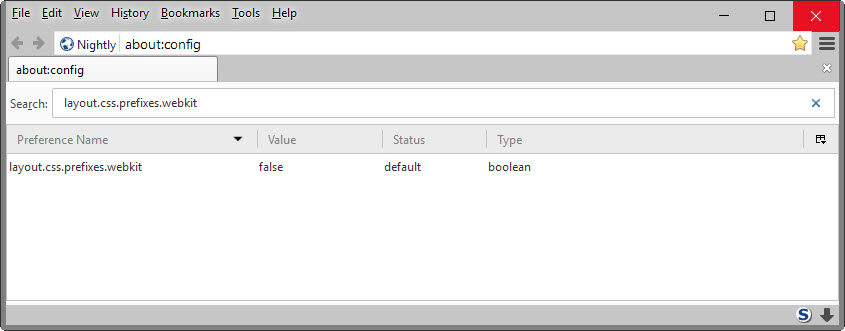Mozilla to improve Firefox WebKit compatibility
WebKit-based browsers are a dominating force, especially in the mobile world where they are dominating the landscape but more and more also on the desktop.
This should not be a problem compatibility-wise for non-WebKit-based browsers like Firefox, but the truth is that it depends largely on developers and site operators if that is indeed the case.
So-called -webkit prefixed CSS properties and features are being used around the web to make sites and services display fine in WebKit-based browsers.
If there is no fallback, sites may display incorrectly in other browsers or may be outright broken, even if those browsers support the underlying features as well.
There are a couple of explanations why developers or site operators use -webkit prefixes only including laziness, budget constraints, or implementing features at a time where only WebKit browsers supported them.
To counter this, Mozilla added a whitelist of sites that use -webkit prefixes to Firefox in mid-2015 to improve support for these sites in the browser. The list contained almost exclusively sites from Asia for mobile use at the time.
The situation seems to have gotten worse however and not better, and Mozilla made the decision recently to do away with the whitelist to enable support for certain -webkit specific prefixes for all sites visited in Firefox.

The bug, "Alias the most important WebKit CSS properties & features for mobile compatibility" is the main tracking bug for the implementation of the feature.
Mozilla has already launched the new feature in Nightly versions of the Firefox web browser, and plans to make it available in Firefox 46 or 47 Stable depending on development progress.
Firefox Nightly users need to enable a preference in the web browser before it becomes available.
- Type about:config in the browser's address bar and hit enter.
- Confirm that you will be careful.
- Search for the preference layout.css.prefixes.webkit.
- Double-click it.
If layout.css.prefixes.webkit is set to true, it is enable and webkit emulation is running, if set to false, the feature is disabled.
The preference is already part of Firefox Nightly on the desktop and for mobile, and will be made available in other Firefox channels in the coming months.
Mozilla has started to work on a compatibility listing of vendor-specific CSS properties and DOM APIs on top of that that.
This standard describes a collection of non-standard (and often vendor-prefixed) CSS properties and DOM APIs that web browsers need to support for compatibility with the de facto web.
Closing Words
The move should improve compatibility of Firefox especially on the mobile web. While it is definitely beneficial to users of the browser because of that, it may push developers even further down the "WebKit route".
This article was first seen on ComTek's "TekBits" Technology News

- Log in to post comments